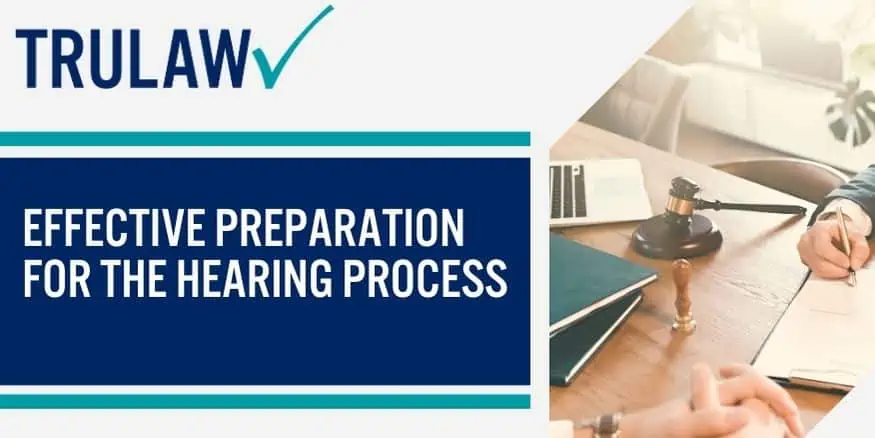SSDI Lawsuits: Your Comprehensive Guide to Navigating the Process
- Last Updated: July 14th, 2025

Attorney Jessica Paluch-Hoerman, founder of TruLaw, has over 28 years of experience as a personal injury and mass tort attorney, and previously worked as an international tax attorney at Deloitte. Jessie collaborates with attorneys nationwide — enabling her to share reliable, up-to-date legal information with our readers.
Legally Reviewed
This article has been written and reviewed for legal accuracy and clarity by the team of writers and legal experts at TruLaw and is as accurate as possible. This content should not be taken as legal advice from an attorney. If you would like to learn more about our owner and experienced injury lawyer, Jessie Paluch, you can do so here.
Fact-Checked
TruLaw does everything possible to make sure the information in this article is up to date and accurate. If you need specific legal advice about your case, contact us by using the chat on the bottom of this page. This article should not be taken as advice from an attorney.
Key takeaways:
- The Social Security Disability Insurance (SSDI) program has strict eligibility criteria. A common reason for denial is failing to meet these criteria.
- Remember, SSDI claims denial isn’t the end of the road.
- Navigating the complexities of Social Security Disability Insurance (SSDI) lawsuits can be challenging.
SSDI Lawsuits: Your Comprehensive Guide to Navigating the Process
On this page, we’ll discuss SSDI lawsuits, how legal help can get you the benefits you deserve, who qualifies to file an SSDI lawsuit, and much more.
Intro to SSDI Lawsuits
Embarking on SSDI lawsuits can seem daunting, but understanding the initial steps is crucial.
The process involves meticulous gathering of necessary documentation and adherence to vocational guidelines.
Legal representation plays a significant role in navigating this complex landscape, offering guidance at every step.
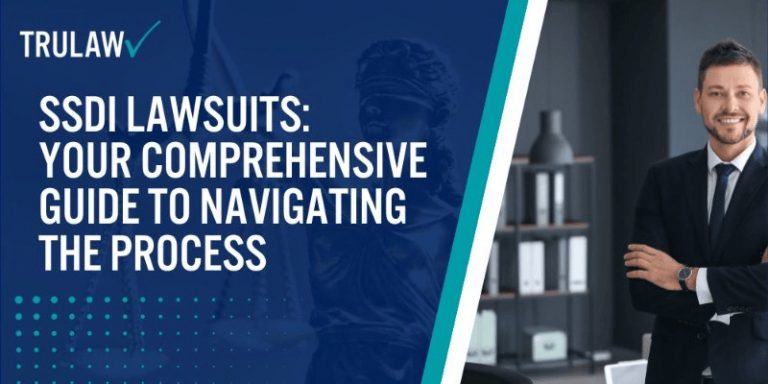
Whether you’re a stepchild seeking to understand your rights or someone facing an offset due to SSDI benefits, knowing the ins and outs of these lawsuits can make a world of difference.
This blog post aims to shed light on these aspects, providing readers with an informed perspective on SSDI lawsuits.
Table of Contents
Understanding SSDI Lawsuits: A Comprehensive Overview
SSDI lawsuits can be a complex terrain to navigate.
This section will help you understand the definition, purpose, key players involved, common outcomes and potential challenges of SSDI lawsuits As Supplemental Security Income.
What are SSDI Lawsuits
Social Security Disability Insurance lawsuits are legal proceedings initiated when an individual’s application for disability benefits is denied by the Social Security Administration (SSA).
The primary purpose of these suits is to challenge the SSA’s decision and secure rightful coverage for the claimant.
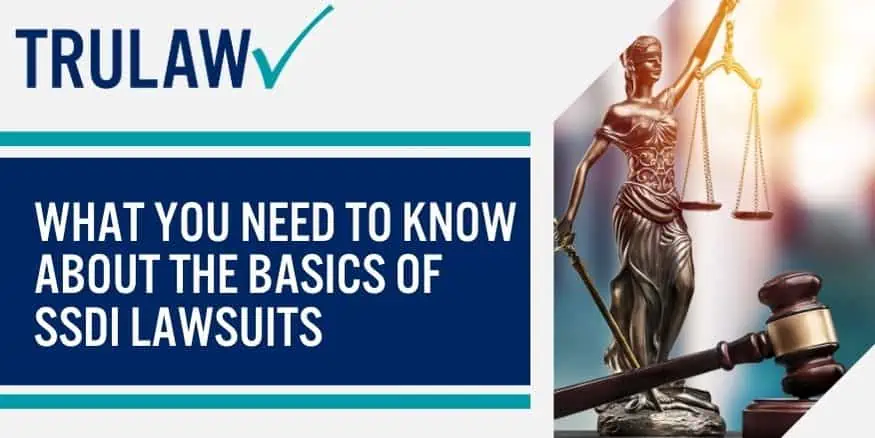
In such a lawsuit, the claimant seeks a computation of their disability benefits that aligns with their medical condition and financial needs.
It’s not just about getting some sum; it’s about ensuring fair treatment in line with federal laws.
Key Players in an SSDI Lawsuit
Here are several key players have significant roles in an SSDI lawsuit:
- The Claimant: This is the person who has filed for disability benefits and has been denied by the SSA.
- The Attorney: The claimant often hires an attorney experienced in SSDI cases to represent them.
- The Judge: The Administrative Law Judge (ALJ) presides over hearings related to SSDI claims.
- Vocational Expert: The vocational expert provides testimony on what jobs, if any, the claimant can perform despite their disabilities.
Common Outcomes of an SSDI Lawsuit
Here are three possible outcomes from an SSDI lawsuit:
- Favorable Decision: The judge rules in favor of the claimant, granting them disability benefits.
- Unfavorable Decision: The judge denies the appeal, agreeing with SSA’s original decision.
- Partially Favorable Decision: Here, the judge agrees that the claimant is disabled but disagrees on when the disability began or its severity.
Potential Challenges
Despite its potential benefits, pursuing an SSDI lawsuit can be fraught with challenges.
Here are the potential challenges:
- Lengthy Process: It often takes a long time to resolve SSDI lawsuits, leaving claimants in financial stress.
- Complex Legal Procedures: The legal process can be confusing and overwhelming for claimants.
- Costs: Hiring an attorney and other associated costs can add up, especially if the lawsuit drags on.
Understanding these aspects of SSDI lawsuits is crucial when navigating this complex process.
Whether you’re a claimant or someone supporting one, being informed is your best defense.
Consulting an SSDI Attorney for Legal Advice
Navigating the complex world of Social Security Disability Insurance (SSDI) lawsuits can be a daunting task.
Seeking legal advice from a SSDI attorney can improve your chances of success, but knowing when and how to find the right attorney is essential.
When to Seek Legal Advice
The moment you consider filing an SSDI claim, it’s time to seek legal advice.
The process is complicated, filled with intricate paperwork and strict deadlines that are easy to miss without professional guidance.
An attorney can help you understand the eligibility criteria.
They will guide you through each stage of the application process.

They ensure all necessary medical documentation is submitted correctly
A lawyer’s expertise becomes even more crucial if your initial claim gets denied.
Attorneys specialize in appealing denials, increasing your chances of overturning the decision.
How a Lawyer Improves Your Success Chances
Your disability attorney plays a pivotal role in improving your odds of winning an SSDI lawsuit.
Their knowledge and experience with the system give them an advantage over someone trying to navigate it alone.
Lawyers know what kind of medical evidence is most persuasive
They prepare you for any consultative exams requested by the agency
They represent you effectively during hearings or court proceedings
In short, having a seasoned lawyer by your side makes navigating this convoluted process smoother and less stressful.
Choosing Your Case’s Right Attorney
Choosing the right attorney for your case isn’t just about hiring someone with experience in SSDI lawsuits; it’s about finding someone who understands your unique situation.
Here are some factors to consider in choosing the right attorney:
- Look at their track record – How successful have they been with similar cases?
- Consider their fees – Most attorneys work on contingency, meaning they only get paid if they win your case.
- Check their communication style – You want someone who’ll keep you informed throughout the process.
- Consider their resources – Do they have a network of medical providers to consult with?
Remember, your attorney is not just a legal advisor but also an advocate who will fight for your rights.
Whether you’re an adopted child seeking SSDI benefits or a real estate agent unable to work due to disability, having the right legal representation can make all the difference.
So take your time, do your research and choose wisely.
Initiating the SSDI Application Process
We’re diving into the nitty-gritty of starting your SSDI application.
Let’s get this show on the road!
Preparing to Apply
Before you jump in headfirst, make sure you’ve got all your ducks in a row.
Here are the things where the Social Security Administration (SSA) has specific eligibility criteria for SSDI benefits:
- You need to have paid Social Security taxes and earned enough credits.
- Your disability must be severe enough to prevent you from working.
- The disability should last or be expected to last for at least 12 months or result in death.
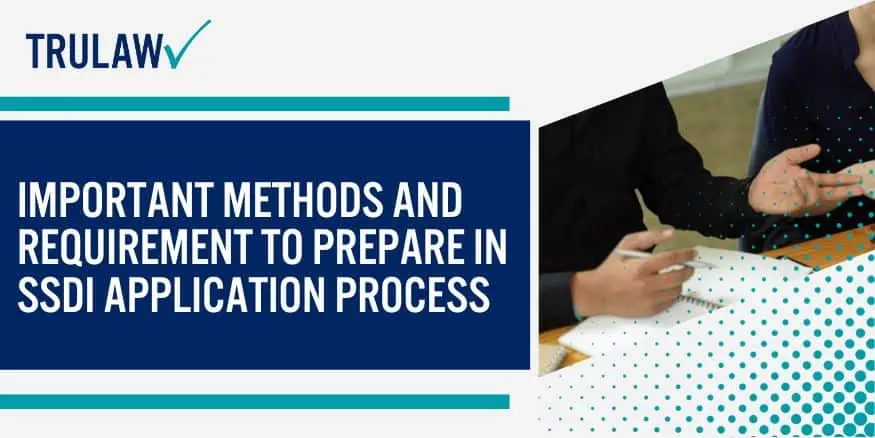
Here are the important requirements you need:
- Birth certificate or other proof of birth
- Proof of U.S citizenship or lawful alien status
- U.S military discharge paper(s) if applicable
- W-2 forms and/or self-employment tax returns for the previous year
Submission Methods and Deadlines
Now that you’re prepared, let’s talk about how to submit your application.
You can apply online through SSA’s website, by phone, or by making an appointment at your local Social Security office.
If applying online isn’t your cup of tea, no worries!
Just give them a ring at their toll-free number.
Keep an eye on those deadlines too!
Generally, there is no set deadline for applying for SSDI benefits but it’s best not to drag your feet here.
Post-submission Expectations
Alrighty then! You’ve submitted your application – what now?
After submission, SSA reviews your application based on their policy guidelines.
This includes verifying your eligibility and checking if your condition meets their definition of disability.
In some cases, they might request additional information or schedule a consultative examination (CE).
Sometimes, it can take 3 to 5 months for the SSA to review an application.
In case of denial, remember you have the right to appeal.
SSDI lawsuits are common and many applicants win their benefits through this route.
Also note, expedited processing is available in certain cases.
For instance, if your condition is severe or terminal, you could be eligible for a quicker decision under SSA’s Compassionate Allowances program.
Handling Denied SSDI Claims and Appeals
Denied claims can be a major setback for disabled people.
However, the administration provides avenues for appeals, giving claimants a chance to contest the decision.
Common Reasons for Denial of Claims
The Social Security Disability Insurance (SSDI) program has strict eligibility criteria.
A common reason for denial is failing to meet these criteria.
For instance, an applicant’s disability might not be severe enough or last long enough according to the SSDI guidelines.
Another frequent cause of denial is work deductions.
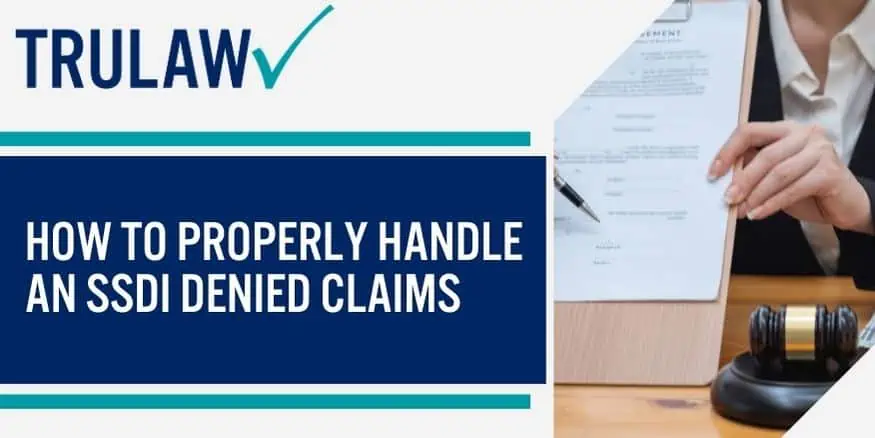
If you’re earning above a certain threshold, it could lead to termination of your benefits.
Former officials’ mistakes also contribute to denied claims.
Misinterpretation of rules or overlooking crucial evidence can unjustly result in claim exclusion.
Steps to Take if Your Claim Is Denied
First off, don’t panic! It’s not uncommon for initial SSDI claims to be denied.
Here’s what you should do if your claim is denied:
- Review the denial letter: The administration will provide reasons for denying your claim.
- Gather additional evidence: If you believe there’s more information that could support your case, compile it.
- Consult with an attorney: They can guide you through the appeal process and help strengthen your case.
Remember, time is critical here! You have only 60 days from receiving the denial notice to file an appeal.
The Appeal Process Explained
Now onto appealing denied SSDI claims – it’s not as daunting as it sounds!
Here are four levels in the appeal process:
- Reconsideration: An entirely new reviewer reevaluates your application.
- Hearing by an administrative law judge: If reconsideration fails, you can request a hearing where you present your case directly.
- Review by the Appeals Council: If dissatisfied with the judge’s decision, ask for a review by the appeals council.
- Federal Court review: As a last resort, you can file a lawsuit in a federal district court.
Throughout the appeal process, it’s crucial to have proper legal representation.
They can help navigate the complexities and increase your chances of success.
Remember, SSDI claims denial isn’t the end of the road.
With patience, persistence, and appropriate legal guidance, you can successfully navigate through administrative appeals and get the benefits you deserve.
Preparing for Your SSDI Hearing
Understanding the SSDI Hearing Process
At an SSDI hearing, you present your case before a judge at the hearing office.
It’s not as formal as a courtroom scenario but it’s still a legal proceeding.
The judge conducts an oral inquiry into your claim, reviewing your earnings record and medical evidence.
Your ability to work, or lack thereof due to disability, is under inspection.
The exam is thorough; everything from your physical capacity to mental health gets scrutinized.
Effective Preparation for Your Hearing Date
Preparation is key when heading into these hearings. Start by understanding what the hearing offices look for in successful claims.
Familiarize yourself with the simplified waiver process.
Know what kind of questions will be asked.
Understand how they review your insurance and earnings records.
Also, consider hiring a lawyer who specializes in SSDI lawsuits.
They know their way around the system and can guide you effectively.
Role of Witnesses and Evidence at Hearings
Witnesses play an essential part in these hearings too.
For instance, if you’re unable to work because of a disability that isn’t visible or easily provable (like chronic pain), a witness can testify about its impact on your life.
You may also need witnesses like previous employers who can vouch for your inability to perform tasks due to your condition.
Their testimonies could tip the scale in your favor during the review process.
Here are some evidence is another crucial aspect of SSDI hearings level proceedings:
- Medical reports: These should clearly show how your condition affects you physically and mentally.
- Work history: This includes any information related to jobs you’ve had in recent years.
- Education records: These help determine whether you could transition into another job given proper training.
- Statements from family members or friends: These provide insight into how daily life has been affected by disability.
Keep all this info handy before you head to the hearing office.
The Role of the HHS and HEW
The Department of Health and Human Services (HHS) and the Department of Health, Education, and Welfare (HEW), represented by Harris in SSDI cases, play a significant role in these hearings.
They ensure that all aspects of your case are thoroughly reviewed before making a decision.
Now, let’s say you’re a parent or mother who has been out of work due to an injury.
Your child’s needs could influence the sum workers can get from SSDI claims.
These departments take into account such factors too.
Presenting Your Case in an SSDI Courtroom
When you’re up against Social Security judges in a district court, state court, or federal court, your communication skills are paramount.
Clear, Concise Communication is Key
Start by laying out all the facts about your disability.
Then introduce any supporting documents like medical records or doctors’ reports.
Next, explain how this evidence relates to your claim for SSDI benefits.
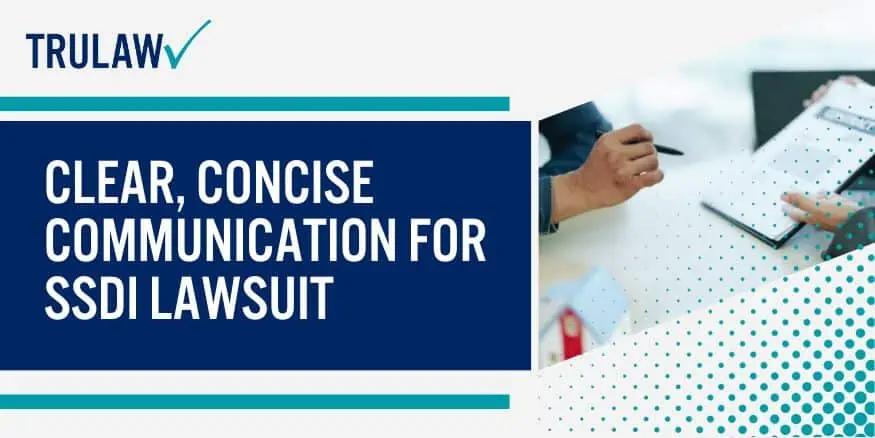
Make sure every piece of evidence has a clear connection to your case.
Lastly, anticipate any arguments that could be made against you and prepare counterarguments beforehand.
This way, you won’t be caught off guard during the hearing.
Post-Hearing Actions and SSDI Benefit Approval
After a successful hearing verdict, there are some next steps to follow.
Let’s take a look at the timeline from approval to receiving benefits payment and how to deal with possible post-hearing appeals or reviews by SSA.
Next Steps After A Successful Hearing Verdict
Once the judge issues a final decision in your favor, it doesn’t mean you can start counting your cash.
There’s still some paperwork that needs to be done before you get your first check.
First off, the judge’s decision goes through an editing process for any legal or clerical errors.
Then, it moves on to the Social Security Administration (SSA) for implementation.
This waiting period can be nerve-wracking but hang tight, you’re almost there!
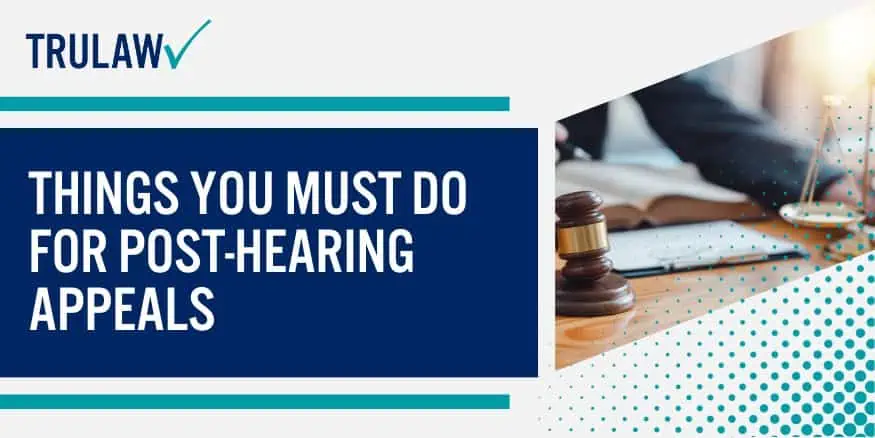
Timeline From Approval To Receiving Benefits Payment
So when do you actually start seeing money?
Well, typically within 60 days of receiving the final decision letter.
It might seem like forever but remember – good things come to those who wait!
Here’s what happens during this time:
The SSA calculates your disability back pay (if applicable).
They determine your monthly benefit amount based on your past gainful activity.
Finally, they set up either direct deposit into your bank account or arrange for paper checks.
Dealing With Possible Post-Hearing Appeals Or Reviews By SSA
Now here comes the tricky part – dealing with possible appeals or reviews by SSA after getting that sweet victory.
You see, even after a favorable decision, SSA has the right to review your case again under certain circumstances.
If they receive new evidence contradicting their initial decision.
If they suspect fraud or misrepresentation in your application.
In such cases, don’t panic!
Consult with an experienced SSDI attorney immediately and prepare yourself for another round of administrative notice and hearings.
The road to finality might be bumpy, but with the right guidance and perseverance, you can see it through to the end.
Receiving SSDI Benefits: What to Expect
Frequency and Method of Benefit Payments
Social Security Disability Insurance SSDI benefits are typically disbursed monthly.
The Social Security Administration (SSA) employs either direct deposit or a prepaid debit card to deliver these payments.
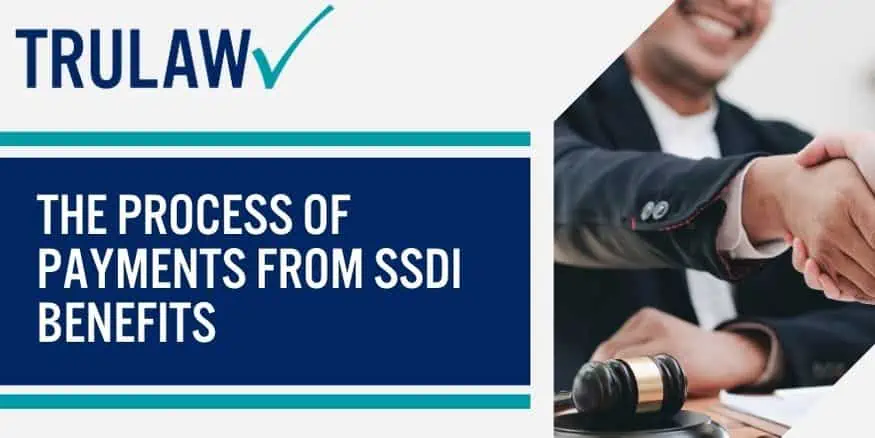
For instance, if you’ve opted for direct deposit, your disability insurance benefits will be transferred straight into your bank account.
This method is both secure and convenient, eliminating the risk of lost or stolen checks.
Long-Term Compliance with SSDI Regulations
Navigating the complexities of Social Security Disability Insurance (SSDI) lawsuits can be challenging.
This guide has provided a thorough overview, from understanding the basics of SSDI lawsuits to knowing what to expect when receiving SSDI benefits.
The process may seem daunting, but with proper legal advice and diligent preparation, it is possible to successfully navigate an SSDI lawsuit.
It’s crucial not to underestimate the importance of professional guidance in this journey.

A qualified SSDI attorney can provide invaluable insight and assistance throughout the process.
They can help you prepare your case, represent you at hearings, and ensure that you understand all regulations for long-term compliance with SSDI regulations.
Reach out today for expert help with your SSDI lawsuit.
Social Security Disability Insurance Frequently Asked Questions
-
Common reasons include lack of sufficient medical evidence supporting disability, previous denials without new information or changes in condition, and non-compliance with prescribed treatment.
-
An attorney can guide you through the appeals process which involves reviewing your application, gathering additional evidence if needed, representing you at hearings and advocating on your behalf.
-
During an SSDI hearing, a judge reviews your case including medical records, work history and personal testimony about how your disability affects daily activities.
-
The time frame varies but typically it takes one to two months after approval before benefits start being paid.
Receiving SSI benefits or SSDI payments would take affect Social Security Disability when settlement proceeds.
-
Yes, there are special rules called “work incentives” that allow individuals receiving benefits to work while still receiving monthly payments.
Studying Lump sum settlements would give you an idea how lump sum payment take after personal injury lawsuit as SSI eligibility and SSI payments for workers compensation benefits.

Managing Attorney & Owner
With over 25 years of legal experience, Jessica Paluch-Hoerman is an Illinois lawyer, a CPA, and a mother of three. She spent the first decade of her career working as an international tax attorney at Deloitte.
In 2009, Jessie co-founded her own law firm with her husband – which has scaled to over 30 employees since its conception.
In 2016, Jessie founded TruLaw, which allows her to collaborate with attorneys and legal experts across the United States on a daily basis. This hypervaluable network of experts is what enables her to share the most reliable, accurate, and up-to-date legal information with our readers!
Additional Social Security Disability Insurance resources on our website:
Here, at TruLaw, we’re committed to helping victims get the justice they deserve.
Alongside our partner law firms, we have successfully collected over $3 Billion in verdicts and settlements on behalf of injured individuals.
Would you like our help?
At TruLaw, we fiercely combat corporations that endanger individuals’ well-being. If you’ve suffered injuries and believe these well-funded entities should be held accountable, we’re here for you.
With TruLaw, you gain access to successful and seasoned lawyers who maximize your chances of success. Our lawyers invest in you—they do not receive a dime until your lawsuit reaches a successful resolution!
AFFF Lawsuit claims are being filed against manufacturers of aqueous film-forming foam (AFFF), commonly used in firefighting.
Claims allege that companies such as 3M, DuPont, and Tyco Fire Products failed to adequately warn users about the potential dangers of AFFF exposure — including increased risks of various cancers and diseases.
Depo Provera Lawsuit claims are being filed by individuals who allege they developed meningioma (a type of brain tumor) after receiving Depo-Provera birth control injections.
A 2024 study found that women using Depo-Provera for at least 1 year are five times more likely to develop meningioma brain tumors compared to those not using the drug.
Suboxone Tooth Decay Lawsuit claims are being filed against Indivior, the manufacturer of Suboxone, a medication used to treat opioid addiction.
Claims allege that Indivior failed to adequately warn users about the potential dangers of severe tooth decay and dental injuries associated with Suboxone’s sublingual film version.
Social Media Harm Lawsuits are being filed against social media companies for allegedly causing mental health issues in children and teens.
Claims allege that companies like Meta, Google, ByteDance, and Snap designed addictive platforms that led to anxiety, depression, and other mental health issues without adequately warning users or parents.
Transvaginal Mesh Lawsuits are being filed against manufacturers of transvaginal mesh products used to treat pelvic organ prolapse (POP) and stress urinary incontinence (SUI).
Claims allege that companies like Ethicon, C.R. Bard, and Boston Scientific failed to adequately warn about potential dangers — including erosion, pain, and infection.
Bair Hugger Warming Blanket Lawsuits involve claims against 3M — alleging their surgical warming blankets caused severe infections and complications (particularly in hip and knee replacement surgeries).
Plaintiffs claim 3M failed to warn about potential risks — despite knowing about increased risk of deep joint infections since 2011.
Baby Formula NEC Lawsuit claims are being filed against manufacturers of cow’s milk-based baby formula products.
Claims allege that companies like Abbott Laboratories (Similac) and Mead Johnson & Company (Enfamil) failed to warn about the increased risk of necrotizing enterocolitis (NEC) in premature infants.
Here, at TruLaw, we’re committed to helping victims get the justice they deserve.
Alongside our partner law firms, we have successfully collected over $3 Billion in verdicts and settlements on behalf of injured individuals.
Would you like our help?
